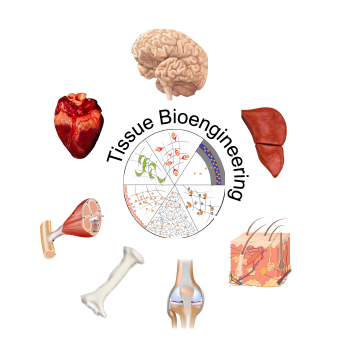[1052] Bioengineering and NeuroRegeneration

Injuries to the peripheral and central nervous system result in pain and loss of sensory-motor function. Notably, millions of individuals worldwide suffer from life-long disabilities due to a lack of effective therapeutic options. The field of regenerative medicine holds great potential for the treatment of these patients, including a subsequent impact on the healthcare system by reducing the socioeconomic burden and improving patients’ quality of life.
Within this context, cell and tissue bioengineering plays a key role for the development of ready-to-use off-the-shelf tissue grafts, biological products, and implants. Subsequent functional innervation by neural circuits and vascular networks is critical and challenging. Our research is precisely focused on this central dogma of regenerative medicine for the regeneration of damaged tissues and organs, such as peripheral nerves, central nervous tissue, skin, muscles, and dental tissues, and to restore their sensory and motor innervation functions back to a normal state. For this purpose, we will develop novel interdisciplinary approaches and bioinspired strategies for regulating the host-graft interaction, for immunomodulation, and for the survival and functional integration of the transplanted cells, tissue grafts and biological implants.
Our approach involves the bioengineering of hypo-immunogenic cells by manipulating the antigen presenting machinery towards universal donor cell therapy, gene therapy, hydrogels with spatially engineered biochemical properties for the packaging and delivery of cells, including the 3D-biofabrication of tissue grafts with microscale structural precision.
Subsequent investigation of the transplant in the humanized rodent model and large animal sheep model will elucidate the underlying tissue regenerative mechanisms, including the influence of the epigenetic factors, and pave the way for advanced therapeutic medicinal products into clinical settings.
Our mission is not only to invent novel therapeutic strategies, but also to develop implementation strategies for their clinical translation. Currently, we are preparing the dossier for clinical trials to assess the safety and efficacy of adipose-derived stem cells for the regeneration of damaged peripheral nerves in collaboration with the “good medical practices” (GMP) facility at Geneva University Hospitals.
Research areas
- - Bioengineering of nerve grafts
- - Hydrogel-assisted stem cell delivery
- - Localized drug delivery for immunomodulation
- - Regulating the nerve fibrosis and axo-glial regeneration
- - Artificial vascular networks (polymeric capillary trees) for generating the living mini-tissue-like models
- - 3D-bioprinting of tissues and implants with hierarchical structures
- - Rodent and large animal models for elucidating the tissue regeneration mechanisms
